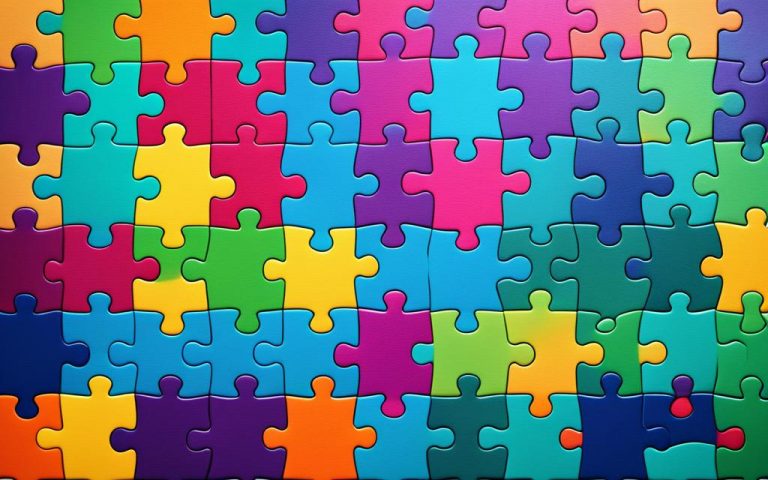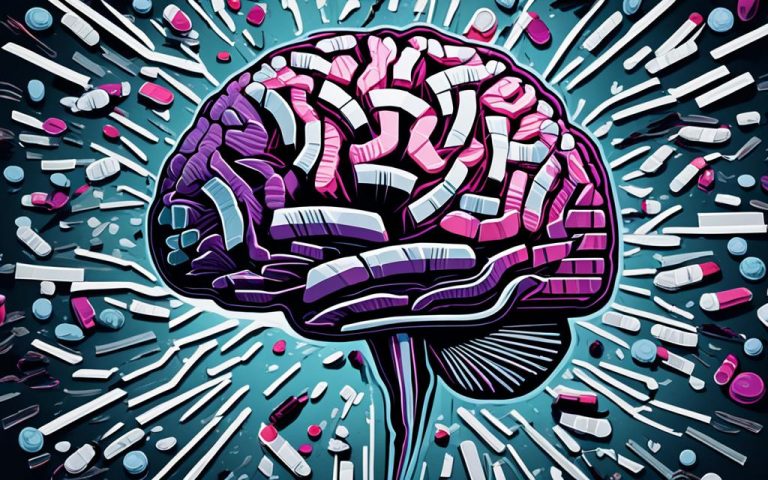Therapy Meaning – Understanding Its Impacts
Welcome to our article on the meaning of therapy and its profound impacts on emotional and mental well-being. Therapy is a powerful tool that helps individuals navigate through life’s challenges and promotes personal growth and healing. It provides a safe and non-judgmental space to explore emotions, address psychological issues, and develop coping strategies.
Key Takeaways
- Therapy helps individuals navigate through challenges and promotes personal growth. (therapy meaning)
- It provides a safe and non-judgmental space to explore emotions and address psychological issues. (therapy definition)
- Therapy can have profound impacts on emotional and mental well-being, improving self-awareness and coping skills. (therapy benefits)
- Various therapy techniques, such as talk therapy and art therapy, are utilized to address different mental health issues effectively. (therapy techniques)
- Understanding therapy involves creating a therapeutic relationship, setting realistic goals, and establishing a safe environment. (understanding therapy)
What Is Therapy?
Therapy is a transformative process that aims to support and assist individuals in navigating through the various challenges and difficulties they may be facing. Whether it is dealing with emotional distress, managing mental health disorders, or enhancing personal growth, therapy provides a safe and non-judgmental space for individuals to explore their thoughts, emotions, and behaviors.
Through therapy, individuals work closely with a trained professional, often referred to as a therapist or counselor, who provides guidance, support, and evidence-based techniques to help them overcome their specific concerns. The therapist helps individuals gain a deeper understanding of themselves, develop coping strategies, and foster positive change in their lives.
Therapy is not a one-size-fits-all approach. It encompasses a range of therapeutic modalities and techniques tailored to address different mental health issues and individual needs. Some common types of therapy include cognitive-behavioral therapy (CBT), psychotherapy, and group therapy.
Therapy provides a safe and non-judgmental space for individuals to explore their thoughts, emotions, and behaviors.
During therapy sessions, individuals have the opportunity to express their feelings, thoughts, and concerns openly. The therapist creates a supportive and confidential environment, where individuals feel heard, validated, and empowered. Therapy sessions can be conducted on an individual basis, couples therapy, or even in a group setting.
By engaging in therapy, individuals can achieve goals such as:
- Improving emotional well-being
- Managing stress and anxiety
- Developing effective communication skills
- Enhancing self-esteem and self-confidence
- Resolving past traumas
- Fostering healthy relationships
- Developing coping mechanisms
Therapy is a collaborative process, with individuals actively participating in their own healing and growth. It provides a supportive and empowering space for individuals to gain insights, learn new skills, and work towards achieving their personal goals.
Key Takeaways
- Therapy is a transformative process that assists individuals in navigating through challenges and difficulties.
- It provides a safe and non-judgmental space for individuals to explore their thoughts, emotions, and behaviors.
- Therapy involves working with a trained professional who offers guidance, support, and evidence-based techniques.
- Different types of therapy are available, tailored to address individual needs and mental health concerns.
- Engaging in therapy can lead to improved emotional well-being, effective coping skills, and personal growth.
Types of Therapy
When it comes to addressing mental health concerns, therapy offers a diverse range of options. In this section, we will explore different types of therapy and the unique approaches they employ to help individuals navigate their emotional well-being.
- Cognitive-Behavioral Therapy (CBT)
Cognitive-Behavioral Therapy, commonly abbreviated as CBT, focuses on examining the thoughts, beliefs, and behaviors that influence our emotions. By identifying and challenging negative patterns, CBT helps individuals develop healthier coping mechanisms and achieve lasting change.
- Psychotherapy
Psychotherapy encompasses a broad spectrum of therapeutic approaches that aim to alleviate mental and emotional distress. This includes various modalities such as psychodynamic therapy, cognitive-behavioral therapy, and humanistic therapy. Psychotherapy offers a safe and supportive environment for individuals to explore their thoughts, emotions, and experiences.
- Group Therapy
Group therapy involves a small group of individuals who come together to share and discuss their struggles, providing support and understanding to one another. Group therapy promotes a sense of community, allows for shared experiences, and fosters interpersonal growth.
By offering diverse techniques and strategies, these types of therapy provide individuals with tailored approaches to address their unique mental health concerns.
Testimonial:
“Group therapy has been a game-changer for me. Being able to connect and share my experiences with others who truly understand has been incredibly healing. It has given me a sense of belonging and support that I didn’t know was possible.” – Sarah, group therapy participant
Therapy Benefits
Therapy offers a multitude of benefits that can significantly improve your emotional and physical well-being. Through therapy, you can experience enhanced self-awareness, develop effective coping skills, and foster healthier, more fulfilling relationships.
Therapy provides a safe and supportive space for individuals to explore their thoughts and emotions, gaining valuable insights into their own behaviors, patterns, and beliefs. This increased self-awareness allows you to make positive changes and develop a deeper understanding of yourself.
One of the key benefits of therapy is the acquisition of effective coping skills. Therapy equips you with the tools and techniques necessary to navigate life’s challenges and manage stress, anxiety, or other mental health issues. By learning these skills, you gain resilience and a sense of empowerment to face difficult situations.
Moreover, therapy can greatly contribute to the strengthening of relationships. Through therapy, individuals can overcome communication barriers, resolve conflicts, and develop healthier relationship patterns. This improved interpersonal skills can positively impact all areas of life, including personal, professional, and intimate relationships.
Cognitive restructuring: A therapy technique that transforms negative thought patterns
One therapy technique that can greatly help individuals is cognitive restructuring. It focuses on identifying and challenging negative or distorted thoughts, replacing them with healthier and more positive beliefs. By reframing negative perspectives, cognitive restructuring enables individuals to enhance their emotional well-being and develop a more optimistic outlook on life.
With the numerous benefits that therapy offers, it is truly an investment in your overall well-being and personal growth. By taking the step to seek therapy, you are embarking on a journey towards a happier, healthier, and more fulfilling life.
| Benefits of Therapy |
|---|
| Improved self-awareness |
| Enhanced coping skills |
| Strengthened relationships |
Therapy Techniques
In this section, we will explore various therapy techniques that are utilized to effectively address different mental health issues. These techniques are designed to help individuals gain insights, develop coping strategies, and achieve positive changes in their lives.
Talk Therapy
Talk therapy, also known as psychotherapy or counseling, involves open and honest conversations between the therapist and the individual seeking therapy. Through active listening and empathetic responses, the therapist creates a safe and supportive environment for the individual to express their thoughts, emotions, and concerns. Talk therapy can help individuals gain self-awareness, explore their beliefs, and develop healthier ways of thinking and behaving.
Art Therapy
Art therapy is a form of therapy that incorporates creative expression as a means of communication and exploration. By engaging in different art mediums such as painting, drawing, or sculpting, individuals can tap into their subconscious and express emotions that may be difficult to put into words. Art therapy offers a non-verbal way of processing experiences, promoting self-discovery and emotional healing.

Cognitive Restructuring
Cognitive restructuring is a therapy technique that focuses on identifying and challenging negative or irrational thoughts and replacing them with more positive and realistic ones. By examining underlying beliefs and cognitive distortions, individuals can reframe their thinking patterns and develop a more balanced and adaptive mindset. Cognitive restructuring is often used in cognitive-behavioral therapy to address conditions such as anxiety and depression.
“Art therapy has helped me express my emotions in ways that words couldn’t. It has been a transformative experience, allowing me to process and heal from past traumas.” – Emma, art therapy participant
These therapy techniques, among many others, are tailored to meet the unique needs of each individual. Therapists employ a combination of techniques based on the client’s preferences and therapeutic goals. The effectiveness of therapy techniques lies in their ability to empower individuals, provide new perspectives, and facilitate personal growth.
Understanding Therapy
In therapy, several fundamental principles contribute to its effectiveness in promoting emotional and mental well-being. By understanding these core principles, individuals can gain valuable insight into the therapeutic process and make the most of their therapy sessions.
The Importance of Creating a Safe and Non-Judgmental Space
One of the key principles of therapy is the establishment of a safe and non-judgmental space for individuals to express themselves freely. This space provides a supportive environment where individuals can openly explore their thoughts, emotions, and experiences without fear of criticism or rejection. By fostering trust and confidentiality, therapists create an atmosphere that encourages clients to share their deepest concerns and challenges.
Establishing a Therapeutic Relationship
The therapeutic relationship between the therapist and the client is another crucial aspect of therapy. It is built on mutual trust, respect, and empathy. Within this therapeutic alliance, clients feel heard, understood, and validated. The therapist serves as a collaborator and guide, offering guidance and support as clients navigate their personal journey towards healing and self-discovery. This relationship forms the foundation for successful therapy outcomes.
Setting Realistic Goals
Therapy is most effective when clear and attainable goals are set collaboratively between the therapist and the client. By establishing goals that are specific, measurable, achievable, relevant, and time-bound (SMART), individuals can work towards meaningful outcomes. These goals provide direction and focus throughout the therapy process, serving as milestones for progress and growth.
“Therapy creates a safe haven where you can explore your innermost thoughts, process your emotions, and gain valuable insights into yourself. Through a therapeutic relationship based on trust and the setting of realistic goals, therapy can guide you towards a more fulfilling and balanced life.”
Understanding the key principles of therapy enables individuals to make informed decisions about seeking professional help and embarking on a therapeutic journey. Through the creation of a safe and non-judgmental space, the establishment of a therapeutic relationship, and the setting of realistic goals, therapy offers a transformative process that facilitates personal growth, healing, and resilience.
Explore the infographic below to further enhance your understanding of therapy:
Importance of Therapy
In today’s fast-paced and demanding world, prioritizing your emotional well-being is crucial. Therapy is an invaluable tool that can positively impact your mental health, reduce symptoms of mental health disorders, and enhance your overall quality of life. By seeking therapy, you gain access to a supportive environment and professional guidance to navigate through life’s challenges, overcome obstacles, and achieve personal growth.
Therapy provides a safe space for you to explore your thoughts, emotions, and experiences in a non-judgmental setting. It offers you the opportunity to gain self-awareness, develop coping skills, and build resilience in the face of adversity. Through therapy, you can unravel underlying causes of stress, anxiety, or depression and work towards healing and emotional balance.
One of the primary benefits of therapy is its ability to alleviate symptoms of mental health disorders. Whether you’re struggling with depression, anxiety, or trauma-related issues, therapy equips you with coping strategies tailored to your specific needs. Additionally, therapy can foster healthier relationships by helping you improve communication skills, establish boundaries, and cultivate empathy and understanding.
“Therapy is a collaborative process that helps individuals gain a deeper understanding of themselves and empowers them to make positive changes in their lives.”
In the words of renowned therapist Irvin Yalom, “The most important aspects of therapy are the relationship between the therapist and patient, as well as the patient’s commitment to change.” Therapy offers a unique opportunity for you to forge a strong therapeutic alliance with a trained professional who will guide you on your journey of self-discovery and growth.
By engaging in therapy, you take an active role in your mental health and overall well-being. You gain valuable insights, learn effective coping mechanisms, and foster a greater sense of self-compassion, self-acceptance, and self-confidence. Therapy can be a transformative experience that empowers you to lead a more fulfilling and meaningful life.
| Benefits of Therapy | How Therapy Can Help |
|---|---|
| 1. Improved emotional well-being | 1. Gain self-awareness and develop coping skills |
| 2. Reduced symptoms of mental health disorders | 2. Alleviate symptoms of depression, anxiety, and trauma |
| 3. Enhanced overall quality of life | 3. Improve communication and establish healthier relationships |
| 4. Increased self-awareness and self-compassion | 4. Foster personal growth and resilience |
Therapy Approach – Psychotherapy
In this section, we will focus on psychotherapy, a widely used approach in therapy. Psychotherapy encompasses various modalities, each with its unique techniques and methods. These therapeutic approaches aim to address specific psychological issues and promote emotional well-being.
Psychodynamic Therapy
Psychodynamic therapy, also known as psychoanalytic therapy, emphasizes the exploration of unconscious thoughts and emotions that influence behavior and relationships. This approach delves into the past experiences and childhood traumas to gain insight into present challenges and develop healthier coping mechanisms.
Cognitive-Behavioral Therapy (CBT)
Cognitive-Behavioral Therapy (CBT) focuses on the connection between thoughts, feelings, and behaviors. This approach helps individuals identify and challenge negative or distorted thinking patterns that contribute to emotional distress. By replacing maladaptive thoughts with more realistic and positive ones, CBT aims to improve overall well-being.
Humanistic Therapies
Humanistic therapies, such as person-centered therapy and Gestalt therapy, emphasize self-exploration, personal growth, and the inherent goodness of individuals. These approaches prioritize the therapeutic relationship and foster empathy, acceptance, and unconditional positive regard to facilitate self-discovery and self-acceptance.
“Psychotherapy provides individuals with a safe and supportive environment to explore their thoughts, emotions, and experiences. It empowers individuals to develop insight, discover their strengths, and make positive changes in their lives.” – Dr. Maya Sharma, Clinical Psychologist.
Psychotherapy offers individuals a holistic and individualized approach to address mental health concerns. By considering the unique needs and circumstances of each person, therapists can tailor therapy sessions to facilitate personal growth, healing, and resilience.
Now, let’s explore some treatment modalities and techniques that psychotherapists often utilize in their practice, providing individuals with effective tools for self-exploration and emotional well-being.
Conclusion
In conclusion, therapy is a crucial tool for promoting emotional and mental well-being. By understanding the meaning of therapy and exploring its various techniques, individuals can make informed decisions to improve their overall quality of life.
Therapy provides a safe and non-judgmental space for personal growth, healing, and resilience. It offers individuals the opportunity to develop self-awareness, enhance coping skills, and strengthen relationships. Through therapy, individuals can navigate through life’s challenges and achieve a greater sense of emotional balance and fulfillment.
Recognizing the benefits of therapy, individuals can seek professional help to address specific mental health concerns, reduce symptoms of mental health disorders, and improve their overall quality of life. Whether it’s cognitive-behavioral therapy, psychotherapy, or group therapy, therapy offers a pathway to self-discovery, personal growth, and lasting positive change.
FAQ -Therapy Meaning
What is therapy?
Therapy refers to the process of working with a trained professional, such as a therapist or counselor, to address emotional, psychological, or behavioral issues. It involves talking and sharing experiences in a safe and supportive environment to gain insight, develop coping skills, and achieve personal growth.
What are the different types of therapy?
There are various types of therapy available, including cognitive-behavioral therapy (CBT), psychotherapy, group therapy, family therapy, and art therapy, to name a few. Each type of therapy offers unique approaches and techniques to address specific mental health concerns.
What are the benefits of therapy?
Therapy can provide a range of benefits, such as improved self-awareness, enhanced coping skills, reduced symptoms of mental health disorders, strengthened relationships, and increased overall well-being. It gives individuals the tools and support they need to overcome challenges and achieve personal growth.
What are some commonly used therapy techniques?
Therapy techniques can vary depending on the therapeutic approach and the specific needs of the individual. Some commonly used techniques include talk therapy, cognitive restructuring, behavioral activation, relaxation techniques, and expressive arts therapy. These techniques aim to help individuals explore their thoughts, emotions, and behaviors to facilitate positive change.
What is the importance of therapy?
Therapy is important because it provides individuals with a safe and non-judgmental space to explore their emotions, thoughts, and experiences. It helps to increase self-awareness, build resilience, improve coping mechanisms, and develop healthier ways of relating to oneself and others. Therapy can also play a crucial role in managing and reducing symptoms of mental health disorders.
What is psychotherapy?
Psychotherapy is a type of therapy that focuses on addressing psychological issues and promoting emotional well-being. It involves an in-depth exploration of a person’s thoughts, feelings, and behaviors to gain insight into underlying issues and develop strategies for change. Various modalities of psychotherapy, such as psychodynamic, cognitive-behavioral, and humanistic therapies, are used to tailor the therapy approach to the individual’s needs.







